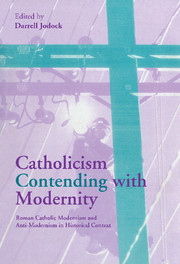 Catholicism Contending with Modernity
Catholicism Contending with Modernity Book contents
- Frontmatter
- Contents
- List of contributors
- Acknowledgments
- List of abbreviations
- Note on the text
- Introduction I: The Modernist crisis
- Introduction II: The Modernists and the anti-Modernists
- PART I THE LATE NINETEENTH-CENTURY SETTING OF MODERNISM AND ANTI-MODERNISM
- PART II MAURICE BLONDEL AND ALFRED LOISY IN FRANCE
- PART III FRIEDRICH VON HÜGEL AND MAUDE PETRE IN ENGLAND
- PART IV SOCIAL MODERNISM AND ANTI-MODERNISM IN FRANCE
- 10 Social modernism: the case of the Semaines sociales
- 11 Anti-Modernism and the elective affinity between politics and philosophy
- Conclusion
- Index
10 - Social modernism: the case of the Semaines sociales
Published online by Cambridge University Press: 30 October 2009
- Frontmatter
- Contents
- List of contributors
- Acknowledgments
- List of abbreviations
- Note on the text
- Introduction I: The Modernist crisis
- Introduction II: The Modernists and the anti-Modernists
- PART I THE LATE NINETEENTH-CENTURY SETTING OF MODERNISM AND ANTI-MODERNISM
- PART II MAURICE BLONDEL AND ALFRED LOISY IN FRANCE
- PART III FRIEDRICH VON HÜGEL AND MAUDE PETRE IN ENGLAND
- PART IV SOCIAL MODERNISM AND ANTI-MODERNISM IN FRANCE
- 10 Social modernism: the case of the Semaines sociales
- 11 Anti-Modernism and the elective affinity between politics and philosophy
- Conclusion
- Index
Summary
An under-studied dimension of the Modernist crisis is social modernism. During the pontificate of Pius X (1903–1914), the Vatican grew increasingly apprehensive about the way many lay Catholics and clergy were responding to the clamor of the working classes. Approaches to the “social problem” that seemed to undermine the traditional hierarchical and paternalistic structures of authority and social organization were viewed with suspicion. Shortly after the promulgation of the anti-Modernist encyclical Pascendi (1907), the French Catholics of the Semaines sociales were accused of social modernism. This essay will review the Semaine sociale teachings and the accusations of their anti-Modernist critics in order to cast light on the complex conflict of mentalities that divided French Catholics under the Third Republic (1870–1940).
French Catholics were divided over what strategy to adopt to re-Christianize French society. Catholic “restorationists” sought to restore the institutional prerogatives of the Roman Catholic Church, even by way of an alliance with the agnostic, anti-Christian ideologist Charles Maurras and his neo-monarchist political movement of Action française. Catholic “transformationists,” many of whom participated in the Semaines sociales, rejected a top-down, authoritarian imposition of Catholicism in favor of a democratic strategy that viewed the aspirations of the working class for justice as an implicit cry for the kingdom of God.
I will contend, on the one hand, that the dividing line between the social Catholics of the Semaines sociales and their anti-Modernist opponents did not precisely follow the dividing line between doctrinal Modernists and the integralists who were their opponents.
- Type
- Chapter
- Information
- Catholicism Contending with ModernityRoman Catholic Modernism and Anti-Modernism in Historical Context, pp. 277 - 307Publisher: Cambridge University PressPrint publication year: 2000
- 1
- Cited by


